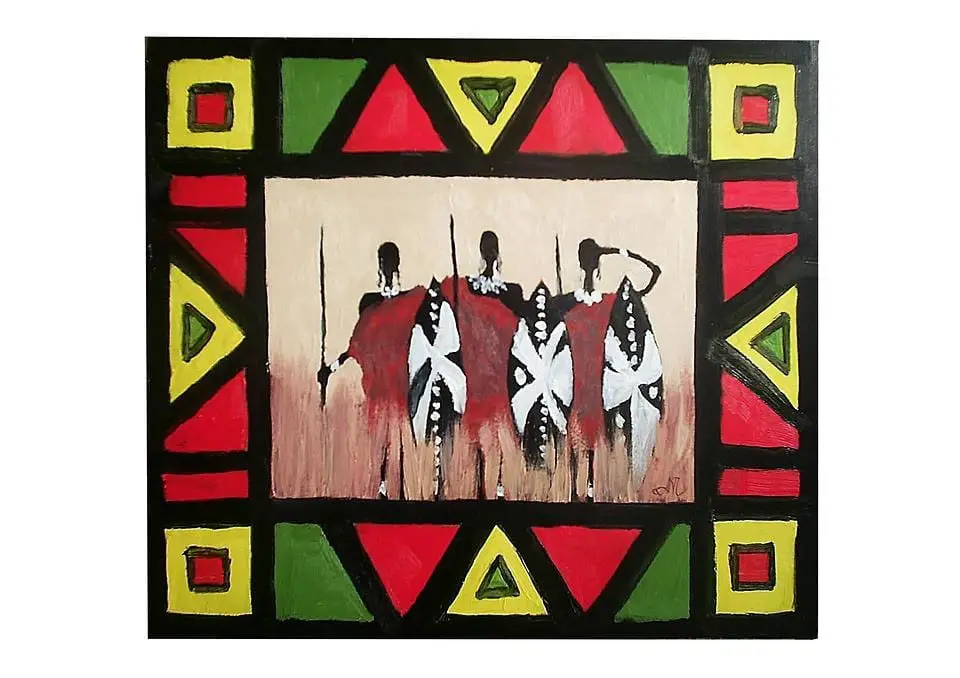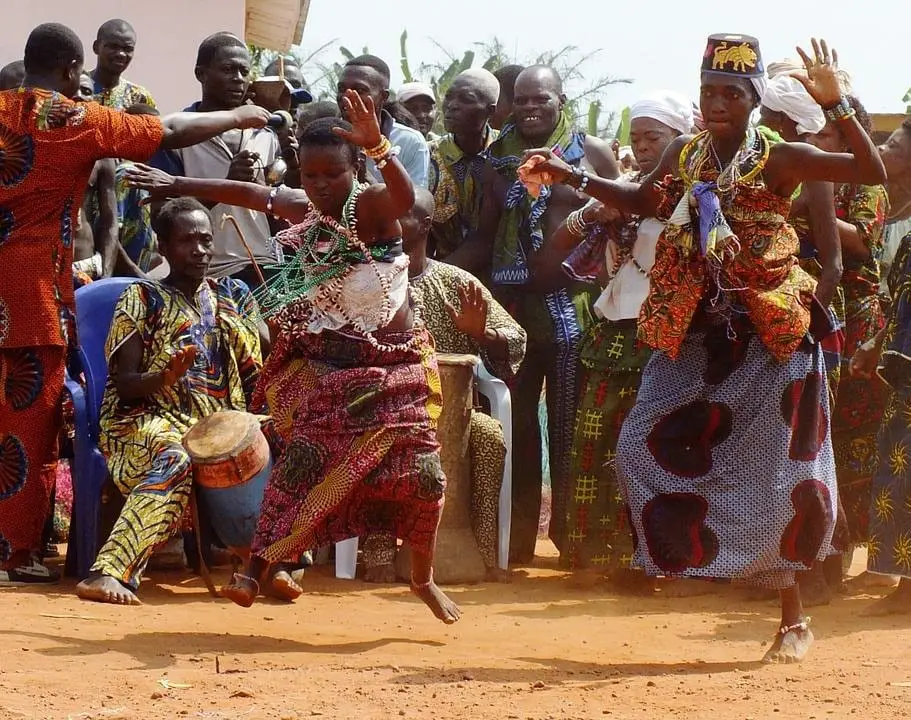
The indigenous spirituality of Africa is multifaceted, and has had a major influence on the culture, art, philosophy and several other aspects of daily living of its people. 80% of African population identify as either Christian or Muslim today. Nevertheless, traditional beliefs and practices continue to play significant roles in society. Indigenous African religions are very diverse and often not strictly monotheistic or polytheistic. There is a multiplicity of ways each of these religions has conceived of the ideas of deities, gods and spirit beings. They tend to be ethnically centered in different regions. They have heavy bearings on the politics, dress, art, diet, health, language, music, dance and rituals of the people of these particular regions.
YORUBA
The Yoruban religion is ethnic to Southwestern Nigeria. The beliefs characteristic to Yoruban spirituality are as follows:
- Followers of this religion believe the cosmos to be divided into Orun (the sky) and Aiye (the earth).
- The sky is the realm where Olodumare, the High God, Orisha (deities), and the ancestors dwell.
- The High God is the creator whereas the deities are believed to have transferred humans to the earth where the latter dwell.
- Yoruban people believe that the deceased members of their families play active roles in their lives and look up to them for fortune, advice and honor. Some people even consider ancestors to be equal in power to the Orisha. Families maintain the shrines of their ancestors in veneration.
- The duty of Yoruban priests and priestesses is to act as mediators between the people, the Orisha and their ancestors.
- The Yoruba diviner is called the Babalawo. He consults the Ifa, an extensive literary body of information that covers medicine, science, metaphysics and cosmology- to find solutions to the problems of the people and society in general.
The Yoruba speak a tonal language. This means that the same word can mean different things based on the pitch of the vowels. Yoruban society is organized into clans, each of whose members has a common ancestor. Descent is of patrilineal type – each son and daughter belongs to the clan of the father. Each clan resides in a compound whose head is the Bale, who is generally the eldest male in the clan. Polygamy is common among Yoruba families and the husband is expected to treat all his wives equally.
The Yoruba circumcise their male and female newborns in their first month. Marriages are arranged after the man negotiates with the woman’s father. Once approved, the groom must give “bride wealth” to the bride’s family. The Yoruba believe in rebirth and many of the rituals associated with burial are made with the hope that the deceased is reborn. A grave is dug on the floor of the room where the deceased lived. After burial, close relatives in the clan feast for a specified period.
ZULU
The Zulu call themselves the “People of the Heavens”, and are ethnic to southern Africa.
- The Zulu believe in a supernatural being called Unkulunkulu who is supposed to have “sprang out of a bed of reeds” and then created the world.
- Human beings are believed to have an umzimba (body) and an idlozi (spirit). In addition, there is the inhliziyo (heart or emotion), the ingqondo (brain or mind) and isithunzi (personality).
- The Zulu that once the ukubiyasa ceremony is performed after death, the isithunzi becomes one with the ancestral spirit.
- Like the Yoruba, the Zulu look up to their ancestors for guidance and favors. Ancestors are believed to have control over the forces of nature and are consulted before all major events.
- Sacrifice is the bridge between people and their ancestors. It is ritually made to the ancestors while looking for favors or in gratitude for blessings. The ukubonga sacrifice is carried out when something good has happened. For instance, it is done when a sickness is cured, when there is plenty of food or when a boy reaches puberty. The ukuthetha sacrifice is made when something goes wrong. For example, this sacrifice is made when someone dies unexpectedly, when there is scarcity of food or when their members are persecuted by outsiders. Cattle or goats are usually sacrificed according to protocol.
- The Zulu traditionally use magic. Diviners and herbalists are commonly sought by people to explain events that are beyond their understanding.
- The philosophy of Ubuntu originated among the Zulu people. It translates to “I am, because you are”. It emphasizes
the qualities of humaneness, generosity, hospitality and gentleness. People were to strive for these qualities for the construction and maintenance of a good society.
The Zulu speak a clicking language. There are hundreds of proverbs written in Zulu about good and bad behavior, human rights and the treatment of people. Zulu society is also organized into clans and is patriarchal in nature. In the rural areas, they live in joint families. Polygamy is common, but an individual is not allowed to marry within the clan of his father or mother.
Birth, puberty, marriage and death are celebrated with music and dancing. Sharing food is also an important part of most celebrations. People actively take part in weaving, craft making, pottery and beadwork.
IGBO
The Igbo people live in Southeastern Nigeria.
- The religion of the Igbo is characterized by the veneration of an earth goddess called Ala, whose will is sought through oracles and divination.
- Some of the Igbo traditionally acknowledge Chukwu or Chineka, a Creator God or Supreme Being.
- Anyanvu – the Sun god is believed to cause trees and crops to grow and bear fruit.
- Igwe – the Sky god is believed to bring rain to the earth
- The earth goddess and other deified spirits are worshipped in shrines and temples. Unlike the Chukwu, these deities are of relevance to the daily life of these people.
- According to one Igbo worldview, the universe is divided into a natural or human level and a spiritual level. Some Igbo regard elements of nature including animals like pythons, crocodiles, tigers and tortoises as mediators between the human and spirit levels.
- Diviners and priests have the Ofo (a symbol of authority, justice and truth). They interpret the wishes of the spirit, bless devotees and punish offenders.
- The living, the dead and the unborn are believed to form parts of a continuum. Enshrined ancestors are supposed to live in a world of the dead that mirrors the world of the living. Ancestors are paid tributes by families through sacrifices.
The Igbo speak a tonal language with many dialects. The society is patrilineal in nature. People live with their extended families and polygamy is common. However the process of marrying an Igbo woman is elaborate. It consists of various stages in which the man asks for the woman’s consent, negotiates using a middleman, the groom’s character is put to test and the bride wealth (dowry) is paid. This often takes more than a year.
The Igbo celebrate birth and marriage. They accept death in old age as a blessings. The deceased is placed on a chair wrapped in grass mats, and buried under the floor of his/her own house. Music and dancing are central to Igbo celebrations and rituals. The people are known for their use of indigenous wind and stringed instruments. Men practice carving and women pottery-making, weaving and glass-painting.

Today, Islam and Christianity have taken the central stage of the religious sphere of Africa. Yet, the indigenous spiritual wisdom and religious practices continue to thrive among the people, although in subdued form. On the other hand, owing mostly to the slave trade, African religions have spread and taken root in several parts of the Americas and Europe. The Regla de Ocha in Cuba, Vodou in Haiti, and Candomble in Brazil are some of these diaspora religions.
An old African proverb says, “The sky is big enough for birds to fly without having to bump into each other”. The pluralistic nature of African spirituality has allowed the people to adapt to other spiritual influences and religions, and to readily absorb their wisdom. This is primarily ascribed to the fact that African religions lack a binding text like the Qur’an or the Bible. African religions were not codified this way and have been passed on by oral tradition alone. This facilitates amendments in their own practices and allows them to be influenced by the ideas and wisdom of other religions and by modern development. It is not a rare sight to see African amulets that contain verses from the Qur’an or the Bible. Many Africans see other religions as complementing and adding spiritual potency to their own practices.
African spirituality and religion is more to its people than their cultural identity. It is a repository of knowledge handed down to generations over centuries that cannot be reproduced elsewhere. Much of African spirituality has fallen out of favor today. However, many people of African descent who return to the continent from the West reconnect with their customs. They encourage and organize indigenous groups to recognize and reinvent their heritage. This gives us the hope that this treasure trove of knowledge and culture will not be lost to us in time.
